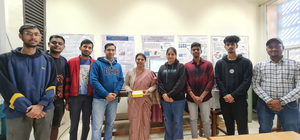
Jodhpur, Feb 22 (IANS) Researchers at the Indian Institute of Technology (IIT) Jodhpur on Thursday announced the development of the first “Make in India” human breath sensor to measure alcohol and other respiratory diseases like asthma and chronic obstructive pulmonary disease.
The device, based on metal oxides and nano silicon operating at room temperature, is primarily aimed to detect alcohol content in the breath in drunk and driving cases.
However, with some changes in sensing layers and the use of an array of sensors (for Electronic Nose or Artificial Nose), and data analytics, it can also be very useful for characterisation of diseases, such as asthma, COPD, diabetic ketoacidosis, sleep apnoea, and cardiac arrest, where the person’s breath volatile organic compounds (VOCs) are monitored.
VOCs are a diverse group of organic chemicals that can evaporate into the air and are commonly found in various products and environments. The current breath analysers are either bulky or require a long preparation time and a heater. This adds up to the power consumption of the device and a long waiting time.
The new sensor operates at room temperature and is like a plug-and-play.
“Continued research and development in these directions could lead to the practical implementation of the breath diagnostics in various fields, ranging from healthcare and wellness to wearable technology and IoT applications,” said Dr Saakshi Dhanekar, Associate Professor, Department of Electrical Engineering, IIT Jodhpur, in a statement.
“The output of the sensors can be connected to Raspberry Pi and the data can be sent to a doctor or phone,” she added.
The technology behind this device is an electronic nose with room-temperature operable heterostructure (metal oxide with nano silicon).
The sensors react with the alcohol in the sample and depict a change in resistance. This change is proportional to the concentration of alcohol in the sample.
Also, the data collected from this sensor array is processed using machine learning algorithms for identifying the patterns of different components of breath and segregating alcohol from the mixture of volatile organic compounds.
The research was published in IEEE Sensors Letters.
–IANS
rvt/prw
Disclaimer
The information contained in this website is for general information purposes only. The information is provided by TodayIndia.news and while we endeavour to keep the information up to date and correct, we make no representations or warranties of any kind, express or implied, about the completeness, accuracy, reliability, suitability or availability with respect to the website or the information, products, services, or related graphics contained on the website for any purpose. Any reliance you place on such information is therefore strictly at your own risk.
In no event will we be liable for any loss or damage including without limitation, indirect or consequential loss or damage, or any loss or damage whatsoever arising from loss of data or profits arising out of, or in connection with, the use of this website.
Through this website you are able to link to other websites which are not under the control of TodayIndia.news We have no control over the nature, content and availability of those sites. The inclusion of any links does not necessarily imply a recommendation or endorse the views expressed within them.
Every effort is made to keep the website up and running smoothly. However, TodayIndia.news takes no responsibility for, and will not be liable for, the website being temporarily unavailable due to technical issues beyond our control.
For any legal details or query please visit original source link given with news or click on Go to Source.
Our translation service aims to offer the most accurate translation possible and we rarely experience any issues with news post. However, as the translation is carried out by third part tool there is a possibility for error to cause the occasional inaccuracy. We therefore require you to accept this disclaimer before confirming any translation news with us.
If you are not willing to accept this disclaimer then we recommend reading news post in its original language.











